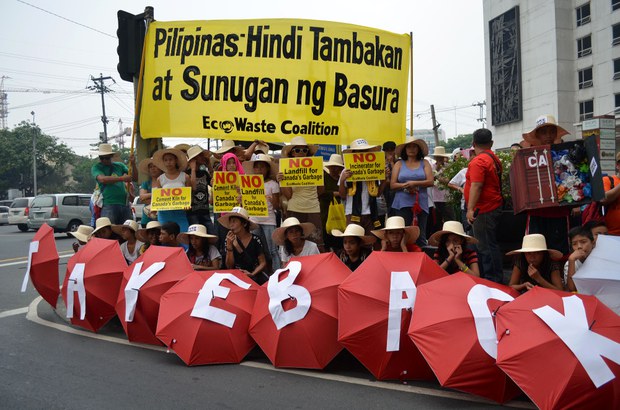Manila Demands Storage Fees from Canada over Garbage
2019.05.15
Cotabato, Philippines
 Filipino environmentalists gather outside the Canadian embassy in Manila demanding an urgent return of Ottawa's reeking garbage that was shipped to the Philippines in 2013 and 2014, May 7, 2015.
Filipino environmentalists gather outside the Canadian embassy in Manila demanding an urgent return of Ottawa's reeking garbage that was shipped to the Philippines in 2013 and 2014, May 7, 2015.
The Philippine government said Wednesday that Canada had not met a deadline set by Manila for taking back tons of garbage that Ottawa exported to the Southeast Asian country, but it expected the trash to be shipped out within three weeks.
President Rodrigo Duterte had earlier berated the Canadians about the trash, giving them until May 15 to take it back. Citing information from the foreign affairs department, Duterte’s spokesman, Salvador Panelo, said the delay in shipping out the waste was due to processing of documents.
“If it’s just a slight delay, the president is a reasonable man,” Panelo told reporters. “What is important is they will take back their waste.”
Panelo emphasized that Canada should also pay a “storage fee” and other penalties, or else “we will throw back their trash back at them.”
The Canadian Embassy in Manila did not immediately return calls from BenarNews seeking comment.
From 2013-2014, more than 100 shipping containers filled with about 2,500 tons of household waste, such as plastic bottles, bags and used adult diapers, were shipped to Manila and falsely labelled as recyclable materials.
The argument ripened last month when Duterte gave Canada an ultimatum and threatened extreme steps if Ottawa didn’t take back its rubbish. “I will not allow that kind of s -- t,” Duterte said at a news conference.
The outburst caught Canada by surprise, and its federal environment minister, Catherine McKenna, immediately assured the Philippines that Ottawa was taking steps to repatriate the trash. She said the containers were mistakenly shipped to Manila.
Reynaldo San Juan, deputy executive director of environmental group BAN Toxics, urged Duterte to ban the importation of hazardous waste and other garbage to avoid a repeat of Canada’s case.
“The righteous anger that Filipinos have expressed over the continued presence of the Canadian trash continues to be frustrated by the long delays in its return to Canada,” San Juan said.
“President Duterte expressed our collective anger, and we need to channel this by taking concrete action and ratify the Basel Ban Amendment immediately,” he said.
The Basel Ban Amendment prohibits the export of hazardous wastes from rich to poorer countries, such as the Philippines. It is an amendment to the Basel Convention on the Transboundary Movement of Hazardous Wastes, an international treaty designed to reduce and control movement of hazardous wastes between countries.
San Juan said the Philippines ratified the Basel Convention in 1994 and had yet to ratify the Basel Ban Amendment.
“We appeal to President Duterte to ratify the Basel Ban Amendment immediately. Put the responsibility of policing hazardous waste exporters to the country of export, such as Canada,” he said.
At least 26 shipping containers of the Canadian trash had been dumped in a private landfill in Capas town in Tarlac province, north of Manila, according to Philippine lawmakers.
The local consignee of the trash shipment, Chronic Plastics, and two Filipino customs brokers were charged in 2016 with violating a local law that bans the movement of toxic wastes. But the trash remained in the country despite a court order to ship it back to Canada.







